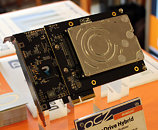- Joined
- Oct 9, 2007
- Messages
- 47,878 (7.38/day)
- Location
- Dublin, Ireland
| System Name | RBMK-1000 |
|---|---|
| Processor | AMD Ryzen 7 5700G |
| Motherboard | Gigabyte B550 AORUS Elite V2 |
| Cooling | DeepCool Gammax L240 V2 |
| Memory | 2x 16GB DDR4-3200 |
| Video Card(s) | Galax RTX 4070 Ti EX |
| Storage | Samsung 990 1TB |
| Display(s) | BenQ 1440p 60 Hz 27-inch |
| Case | Corsair Carbide 100R |
| Audio Device(s) | ASUS SupremeFX S1220A |
| Power Supply | Cooler Master MWE Gold 650W |
| Mouse | ASUS ROG Strix Impact |
| Keyboard | Gamdias Hermes E2 |
| Software | Windows 11 Pro |
While not the very first of its kind, Intel Smart Response technology took the enthusiast community by storm, offering a middle-ground between small but fast SSDs, and large but slow HDDs. By caching on the SSD, Smart Response is able to give system responsiveness a significant boost. Before that, HDD major Seagate put a tiny SSD component onto its Momentus XT hard drive, to chop access times a little. Now OCZ inverted the concept, and strapped an HDD onto its SSD to make it more capacious, on its new RevoDrive Hybrid.
Here, the major component is a SSD RAID 0 on a stick, which pools data onto an HDD. RevoDrive is a PCI-Express x4 SSD card, which uses a number of SandForce SF-1200 driven SSD sub-units in RAID 0 that's abstract to the host machine. The card is normally available in capacities as low as 60 GB, or as high as 480 GB. On RevoDrive Hybrid, OCZ installed a 2.5-inch hard drive with capacities as high as 1 TB, with the SSD component very much intact. The device promises to give you RevoDrive-like speeds, and humongous capacities, by streaming low-access data onto the HDD.

OCZ is using the Nvelo Dataplex technology to handle the SSD caching. The host machine sees the capacity of the HDD, while the card silently juggles data based on its access, between the on die SSD RAID 0 subunits and the hard drive. OCZ claims that the device can very much offer transfer rates of 575 MB/s read, and 500 MB/s write. While OCZ didn't finalize which HDD it will use, it is very pleased with the performance of this storage model, and could even use a 5400 RPM HDD in there.
The OCZ RevoDrive Hybrid will be available in two variants, the first one has 60 GB SSD component with 500 GB HDD, and the second one has 120 GB SSD component with 1 TB HDD.
View at TechPowerUp Main Site
Here, the major component is a SSD RAID 0 on a stick, which pools data onto an HDD. RevoDrive is a PCI-Express x4 SSD card, which uses a number of SandForce SF-1200 driven SSD sub-units in RAID 0 that's abstract to the host machine. The card is normally available in capacities as low as 60 GB, or as high as 480 GB. On RevoDrive Hybrid, OCZ installed a 2.5-inch hard drive with capacities as high as 1 TB, with the SSD component very much intact. The device promises to give you RevoDrive-like speeds, and humongous capacities, by streaming low-access data onto the HDD.

OCZ is using the Nvelo Dataplex technology to handle the SSD caching. The host machine sees the capacity of the HDD, while the card silently juggles data based on its access, between the on die SSD RAID 0 subunits and the hard drive. OCZ claims that the device can very much offer transfer rates of 575 MB/s read, and 500 MB/s write. While OCZ didn't finalize which HDD it will use, it is very pleased with the performance of this storage model, and could even use a 5400 RPM HDD in there.
The OCZ RevoDrive Hybrid will be available in two variants, the first one has 60 GB SSD component with 500 GB HDD, and the second one has 120 GB SSD component with 1 TB HDD.
View at TechPowerUp Main Site





